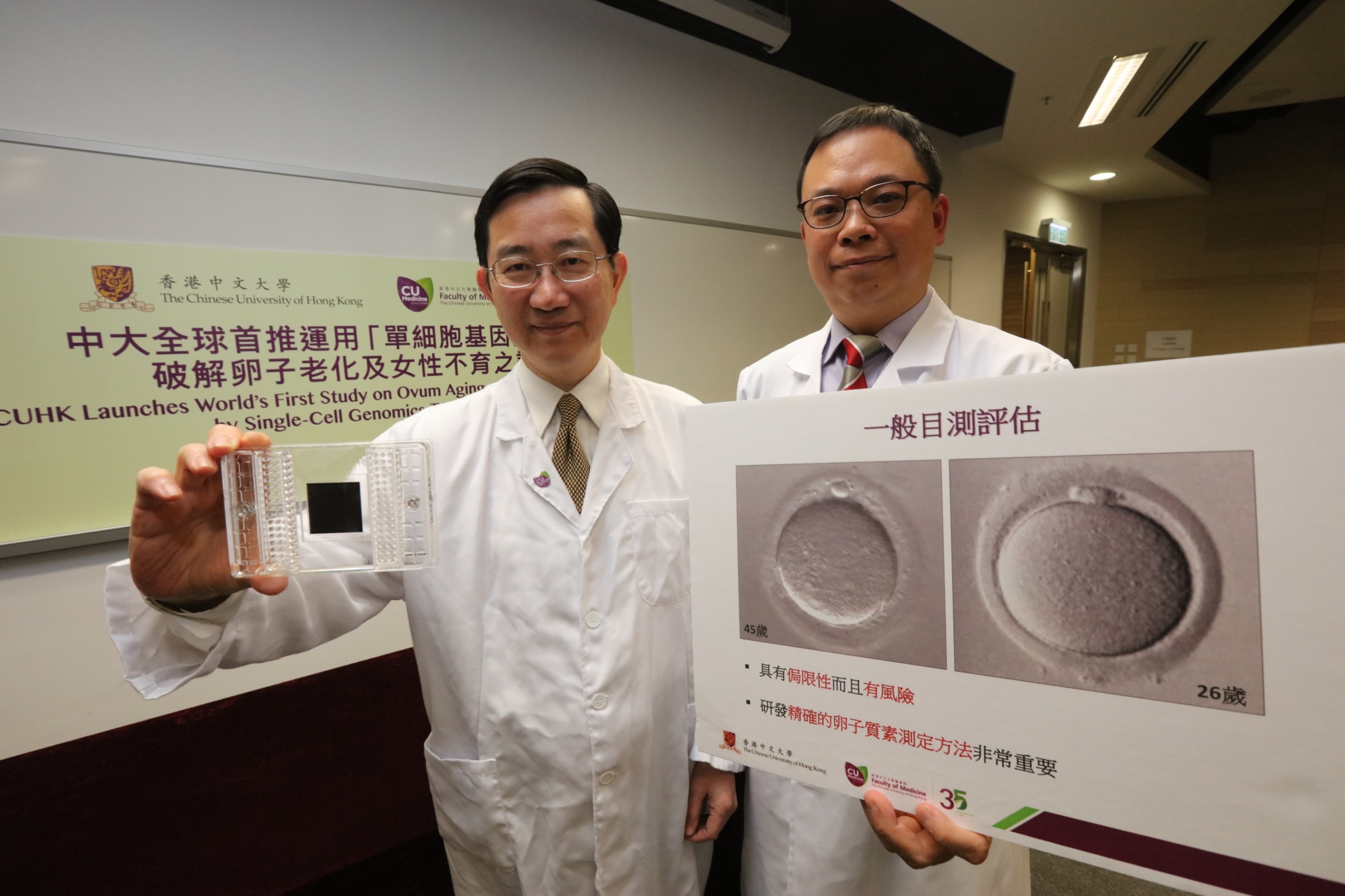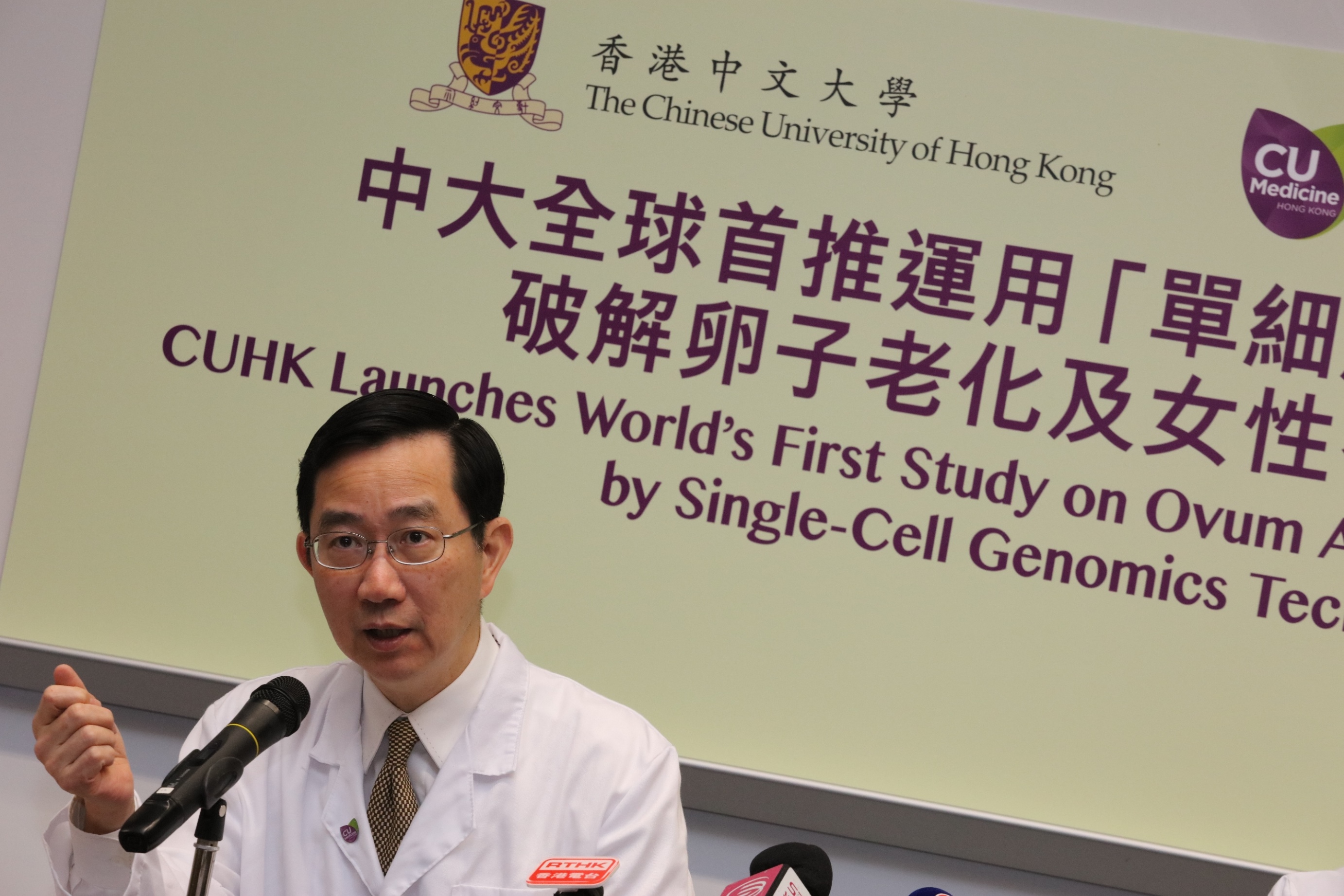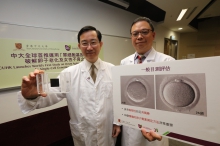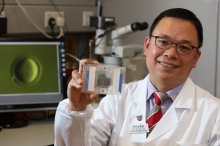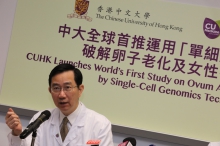CUHK
News Centre
CUHK Launches World’s First Study on Ovum Ageing and Female Infertility by Using Single-Cell Genomics Technology
Ovum quality is a crucial factor for conception and proper embryo development, and is inversely correlated to age. According to international data, at least 1% of women suffer from premature reproductive ageing which can lead to fertility problems or premature menopause. In view of this, the Faculty of Medicine of The Chinese University of Hong Kong (CUHK) has been experimenting with the use of single-cell genomics technology to test oocyte quality. By using this technology, the ageing signature, in terms of aberrant changes on RNA and DNA level from a single oocyte, is decoded to find clues for reproductive ageing and corresponding treatments. Tests have been performed on mice and human samples. The research team is going to launch the world’s first comprehensive study and a community oocyte donation programme.
Advanced maternal age becomes prevalent in Hong Kong. Ovum quality test helps increase successful pregnancy rate and reduce risk to embryo
Delayed marriage and parenthood have become increasingly common in Hong Kong. Data of the Census and Statistics Department of the HKSAR Government in 2012 showed that the overall median childbearing age of women rose from 27 in 1981 to 31.9 thirty years later. The trend predicts that more than half of mothers will be classified as of ‘advanced maternal age’ in the near future, giving birth at the age of 35 or above. Despite advancement in medical science, women with advanced maternal age still have to bear a higher risk in pregnancy, or a higher chance of fetus malformation. As reproductive potential in women declines with age, some women look for an assisting method such as In Vitro Fertilization (IVF) to fulfil their hopes.
Prof. Tin Chiu LI, Professor of the Department of Obstetrics and Gynaecology, Faculty of Medicine at CUHK said, ‘Although IVF raises the chance of pregnancy for women with advanced maternal age, there is not yet any precise ovum quality test available, which leads to unnecessary procedures and increases the risk of having a poor embryo for the patients. Young women may also encounter reproductive premature ageing which makes it more difficult for them to get pregnant or leads to premature menopause.’
Cracking the mystery of oocyte ageing through ‘Single-cell genomic technology’
The School of Biomedical Sciences and the Department of Obstetrics and Gynaecology of the Faculty of Medicine at CUHK has started the study of implementing ‘single-cell genomics’ to test oocyte quality. The research team has successfully obtained complete genomic maps with a single mouse oocyte. A preliminary experiment found that there is a significant difference in the genomic signatures in aged versus young oocyte. The second stage experiment was then performed in human samples and got the same outcome.
Prof. Tin Lap LEE, Associate Professor of the School of Biomedical Sciences explained, ‘Through the experiments casted on lab mice and human samples, we believe “single-cell genomics technology” will provide the most precise oocyte quality test in the near future. It helps giving clues to genetic diseases or defects which will lead to infertility or premature ageing, and allow identification of novel treatment options. We will focus on result validation at the third stage, and hope to put the technology in clinical practice in the near future.’
A public donation programme launched to activate the world’s first comprehensive research in reproductive ageing
CUHK is now launching a ‘public oocyte donation programme’, looking for female volunteers aged between 30 and 45 to join the third stage of the experiment. Professor LEE added, ‘If we succeed in finding donors to activate the research programme, the exercise will not only help infertile couples but also lead to new clues on premature reproductive ageing, so as to generate better family planning or prepare for premature menopause.’
Interested volunteers can call the hotline 3943-4436 or email to leetl@cuhk.edu.hk to join the programme.
Prof. Tin Chiu LI, Professor of the Department of Obstetrics and Gynaecology (left) and Prof. Tin Lap LEE, Associate Professor of the School of Biomedical Sciences, CUHK, introduce the world’s first study on ovum ageing and female infertility by using single-cell genomics technology.


